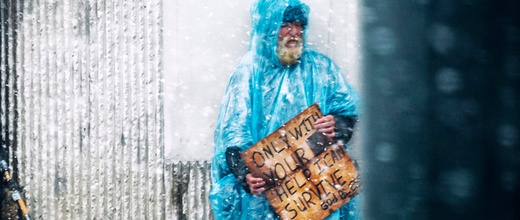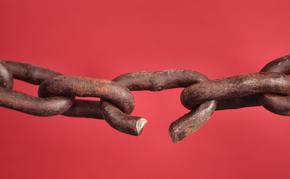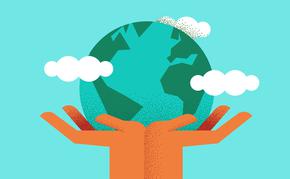The views expressed in our content reflect individual perspectives and do not represent the authoritative views of the Baha'i Faith.
What we want and what we need are not exactly the same thing, but today’s world is full of needs and wants. Marketing organisations and mainstream economists teach us that these needs and wants are natural, but what is not natural is, how these needs and wants have been distributed among the world’s vastly inflated population.
We tend to associate extreme poverty with what has been termed by some as corrupt “Third World Countries.” What we sometimes fail to recognize however, is the fact that there are also worlds within worlds, within all of our countries.
For example, as unbelievable as it seems many working people in the so-called “First World” nations like the USA and the UK now use food banks to get enough to eat. This has seemingly been brought on by a severe deterioration in their standard of living—severe enough to cause pain, ill health and feelings of absolute hopelessness, even though absolute poverty is rare in either of these nations.
However, what kind of civilized society allows some of its citizens to struggle to make ends meet in a state of dejection, while others are allowed to accumulate vast fortunes, which rival or outshine the resources which some less fortunate governments can muster? Moreover, what controls exist to prevent this from happening?
The United States is one of the world’s richest, most powerful and technologically innovative countries; but neither its wealth nor its power nor its technology is being harnessed to address the situation in which 40 million people continue to live in poverty. – a Statement on Visit to the USA, by Professor Philip Alston, United Nations Special Rapporteur on Extreme Poverty and Human Rights, Washington, December 15, 2017.
Perhaps this has something to do with how power is both perceived and exercised—power designed not to protect the nation and its people as a whole, but rather the status quo within the wider world, at any cost.
By most indicators, the US is one of the world’s wealthiest countries. It spends more on national defense than China, Saudi Arabia, Russia, United Kingdom, India, France, and Japan combined. US health care expenditures per capita are double the OECD (Organization for Economic Cooperation and Development) average and much higher than in all other countries. But there are fewer doctors and hospital beds per person than the OECD average. – Ibid.
Many of us are led to believe that we live in an age where much progress has been made, and in deed it has, for child mortality worldwide has steadily decreased, literacy has increased, freedom from oppression has also grown and absolute poverty has fallen, especially in the last few decades—but what remains is a pronounced feeling of injustice. How can that be?
US infant mortality rates in 2013 were the highest in the developed world. Americans can expect to live shorter and sicker lives, compared to people living in any other rich democracy, and the “health gap” between the US and its peer countries continues to grow. U.S. inequality levels are far higher than those in most European countries. Neglected tropical diseases, including Zika, are increasingly common in the USA. It has been estimated that 12 million Americans live with a neglected parasitic infection. A 2017 report documents the prevalence of hookworm in Lowndes County, Alabama. The US has the highest prevalence of obesity in the developed world. In terms of access to water and sanitation the US ranks 36th in the world. – Ibid.
Social and corporate responsibility begins and ends with the wealthy in society, especially those who have managed to accumulate far more than they can ever hope to spend in a lifetime. Vast fortunes in the hands of a few individuals mean that somewhere, someone is suffering as a result. In the absence of legislation to remedy this situation, it is incumbent upon these individuals to exercise voluntarily their responsibilities towards those who are less fortunate than themselves. If not, then it would appear that the majority that are not party to a share of this wealth may eventually be pushed into a state of rebellion. Such a state of affairs would be disastrous for all concerned.
America has the highest incarceration rate in the world, ahead of Turkmenistan, El Salvador, Cuba, Thailand and the Russian Federation. Its rate is nearly 5 times the OECD average. The youth poverty rate in the United States is the highest across the OECD with one quarter of youth living in poverty compared to less than 14% across the OECD. – Ibid.
If we don’t want our cities to burn with indignation, then we have to act collectively in order to bring about the social advancement necessary for a more fair and just society. That society should be not just inclusive, but recognize the common sense of humanity that resides in all of us—and not just in order to feed the rich. How can this be successfully achieved?
The Baha’i teachings say:
Wealth is praiseworthy in the highest degree, if it is acquired by an individual’s own efforts and the grace of God, in commerce, agriculture, art and industry, and if it be expended for philanthropic purposes. – Abdu’l-Baha, The Secret of Divine Civilization, p. 24.
When wealth “is acquired by an individual’s own efforts” and is expended for the good of humanity there can be very little evil attached to it, but when wealth is acquired through the misfortunes of others it is an entirely different matter:
A financier with colossal wealth should not exist whilst near him is a poor man in dire necessity. When we see poverty allowed to reach a condition of starvation it is a sure sign that somewhere we shall find tyranny. Men must bestir themselves in this matter, and no longer delay in altering conditions which bring the misery of grinding poverty to a very large number of the people. The rich must give of their abundance, they must soften their hearts and cultivate a compassionate intelligence, taking thought for those sad ones who are suffering from lack of the very necessities of life. – Abdu’l-Baha, Paris Talks, p. 154.
Whoever we are and whatever we do we need to live by some sort of moral code. Without this we have nothing other than a state of anarchy.
Justice should not be something that only the rich can afford to defend. Universal justice extends globally to all the inhabitants of the planet. In fact it extends even further than this, it extends to those who are unable to defend themselves from tyranny and oppression, and it extends beyond the human realm to the protection of endangered species, plant life and even more importantly to the protection of the entire ecosystem, which we are all part of rich and poor alike.
The thing that will enrich us all the most is having such a strong sense of justice that we will feel extremely uncomfortable in the knowledge that someone or something else within our extremely fragile planet is suffering unnecessarily simply because of ignorance or total blindness.
You May Also Like
Comments

















(Baha'u'llah, Gleanings from the Writings of Baha'u'llah, p. 183)